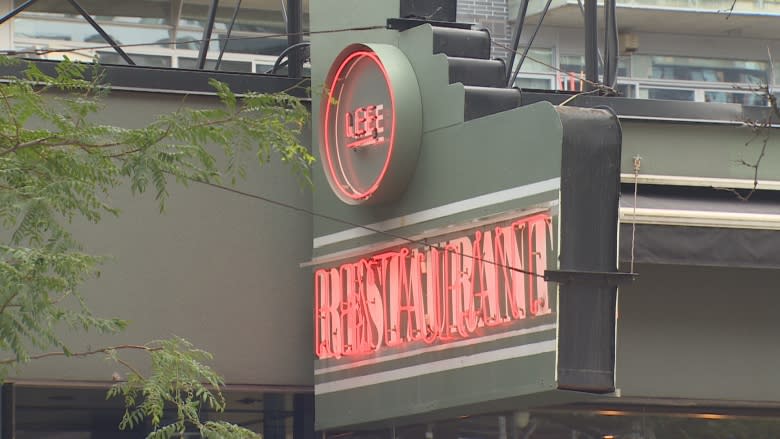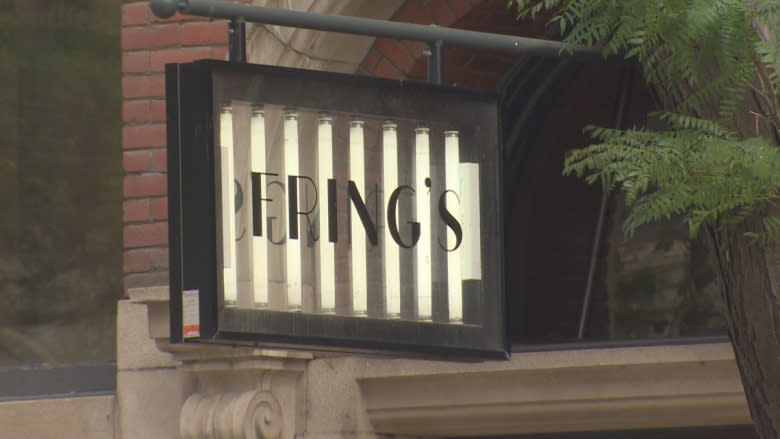IOU system at Susur Lee restaurants required staff to use tips to pay for mistakes
Spilling a drink, sending the wrong drink to a table or punching in an incorrect order with the kitchen were all examples of mistakes that cost employees tip money, according to staff at chef Susur Lee's restaurants — a practice that is forbidden under Ontario's Employment Standards Act.
Workers at the Toronto restaurants Fring's, Lee and the recently closed Bent say they would see what were called IOUs — some worth more than $100 — when they would pick up their tip envelopes. It's a policy that management says is no longer in effect, but workers say it has cost them much-needed cash.
"It was pretty devastating," said Dylan Turner, who worked as a bartender at Fring's for six months before quitting last July.
"It was pretty laughable to show to my other server and bartender friends to show how little money I was making for how much I was working," he said.
Written in ink on the tip envelopes would be the dollar deficit, Turner said. In one of the examples he submitted to CBC Toronto, Turner appeared to have made $528 in tips over four shifts one week, and was charged an IOU of $101.70 for an order of four Jameson shots and three feature cocktails.
Looking back a year later, he thinks his employer deducted the money because the customers walked out on the bill. But, he admits, "I started losing track of all of the reasons for the IOUs because there were so many."
CBC Toronto has spoken to six other former employees and one current employee of Susur Lee's restaurants, and they all confirm the IOU system was in place when they worked there. One case goes back two years.
Many of those CBC Toronto spoke with declined to go on the record, concerned that a "whistleblower" label would cause them grief at the restaurants they've since moved onto, or could hinder furthering a career in the service industry at all.
Taylor Davis, another former bartender at Fring's, who quit in August 2016, says the IOUs created a culture of "intimidation and fear."
"They're terrified of making any mistakes," said Davis speaking of his former colleagues of the popular King Street West restaurant.
He said most of his IOU's were for entering the wrong drink order into the computer system and spillage.
"On average there would be two to three [IOUs] in my tip out every week." They added up to an average $50 a week, said Davis.
Sources told CBC Toronto that sometimes the full price of a meal or drink was deducted from employees' tips. Other times, they said, managers would take pity on workers who had made an error, and only charge them what it cost to make the food or beverage — much less than the menu price.
Turner says there was one mistake he just could not afford.
"I'll never forget it. I poured a shot of 1942 Don Julio for this guy." It was a busy Friday and Turner accidentally poured water into the man's shot. The customer who was drinking it neat, asked for another.
That second pour could have cost Turner $30 out of his tips that week, but he said, "I fought really hard."
His manager took mercy on him and looked the other way. "It was the only time I was let off the hook for an IOU."
Lee response: Money went to staff events, aprons
On Thursday, Kelsea Knowles, executive assistant and public relations co-ordinator for Susur Lee Restaurant Group, responded to a CBC News request for comment.
In an emailed statement, she said they were "unable to accept the request for an on-camera interview," but added: "We are disappointed by these allegations. We take such matters very seriously and are looking into this issue. We will, of course, address any problems."
CBC Toronto followed up with more specific questions regarding the IOUs, about their purpose and where the tip money went.
Knowles responded the next morning, saying the IOU policy was no longer in effect.
"Previously all such payments from the IOUs were used to fund hospitality for staff events. Staff do pay a small fee for the cost of their aprons," she wrote.
While Knowles did not disclose when the policy ended, a current employee said the IOUs stopped last weekend after some employees took to social media to air their complaints.
The Ministry of Labour's website states that since June 2016, "Employers can't withhold, make deductions from, or make their employees return their tips and other gratuities." It goes on to explain providing examples, "employers can't take tips and other gratuities to cover things like: spilled food or beverages, broken supplies (e.g. dishes and glassware)
losses or damages (e.g. from theft or customers who don't pay their bill)."
The ministry has told CBC Toronto it is not investigating any complaints against Lee's restaurant regarding IOUs. It is currently investigating one complaint filed by a former Lee restaurant employee regarding severance and termination pay.
Jen Agg, who owns several restaurants, including The Black Hoof on Dundas Street West, said she was "flabbergasted by the gall" when CBC Toronto reached out to her for perspective on how restaurants deal with staff mistakes.
"Mistakes like broken glasses, delivering to the wrong table, they inevitably happen," she said. "We're only human, but it's pretty inhumane to charge for those mistakes."
With her experience running five restaurants, Agg says many mistakes might be a reflection on how an establishment is managed.
"It's about just teaching someone that they should be aware, that there's money behind this. If you do that and you're careful about it, these things stop happening."
Agg has long encouraged restaurant employees who feel mistreated to do what Turner and Davis are doing: speak up.
"It's about time these young servers come forward," she said.

 Yahoo Finance
Yahoo Finance 


